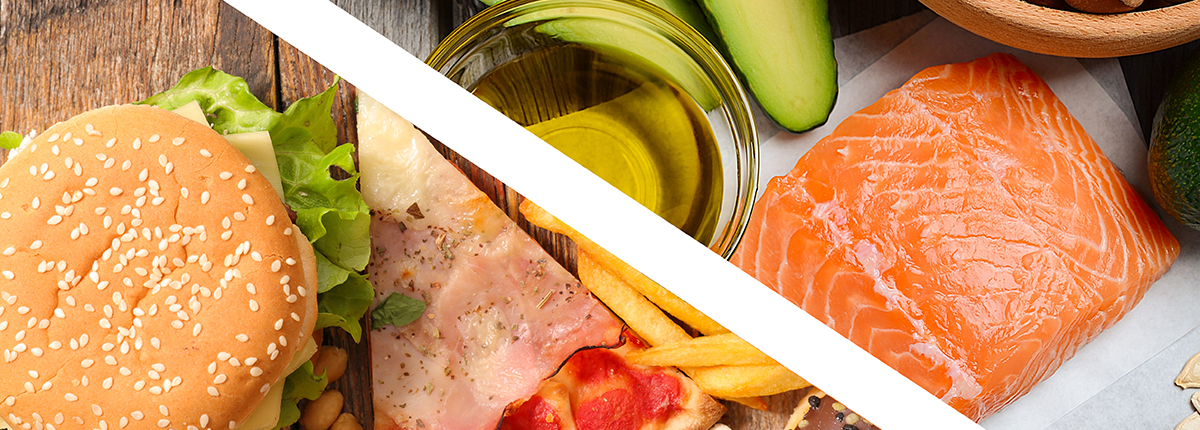EATING FATS CAN HELP YOU LOSE WEIGHT!
So now that I have your attention from reading the title above, did you know that eating the right fats can aid controlled weight loss! How? I hear you ask.
Well to help explain let’s consider the natural role of fat within our diet. We know that the ‘good’ unsaturated fats (polyunsaturated and monounsaturated) found in foods such as oily fish and most nuts, make up the essential macronutrient group alongside carbohydrates and protein. Remember these are the food sources that help provide us with energy every day and support the body’s metabolism, which in turn controls both weight loss and gain.
Here is an interesting fact, if your body has been nourished correctly then at rest fats supply us with 70% of our energy, meaning when you are not exercising the body burns its own stored fats alongside carbohydrates (glycogen) to keep functioning.
To illustrate this further at complete rest for 1 hour you can burn up-to 0.42 calories per pound of body weight. So, if you weigh 150 pounds (68 kilograms) you can burn over 500 calories (1 pound of body fat) across 8 hours of rest (light activity) or sleep. Of course, the rate at which you burn fat is dependent on many factors such as age, weight, sex and metabolism but this quick calculation helps to give you a general idea. Remember you can look up how many calories your body burns at rest and during exercise at any time by firstly calculating your Basal Metabolic Rate (BMR) online. To do this you need to know your height, weight, and age before starting, you then divide your determined BMR figure by 24.
However, to lose inches through your body burning fat tissue at rest is not straightforward and naturally there are a few health considerations such as activity level and hormone imbalances to keep in mind. Both are closely linked to getting the balance of your food plate right. If the body is malnourished (deprived of macronutrients, vitamins, and minerals), a process called catabolism or destructive metabolism will kick in which stops the fat burning process and instead forces the body to utilise muscle tissue for energy. By not eating enough good fats hunger and mental fatigue come to the fore, which in turn stimulates catabolism and all but stops weight loss (fat burning) through malnutrition.
To avoid this chemical process taking place it is important that we all aim to eat a balanced selection of foods every 2-3 hours. For good general health outside of losing weight the breakdown of foods on your plate should usually equate to 50% of carbohydrates, 25% protein and 25% divided between vitamins, minerals, and fats. To divide these percentages up even further here are some additional guidelines for dietary fat intake. Any individual’s daily diet should contain no more than 20 grams of saturated fat (always less than 10% of your daily calories) and, be inclusive of 18.6 and 13 grams of unsaturated good fats (omega 3 and 6) as a minimum. Our overall fat intake including bad fats each day should equate to around 342 calories (male) and 207 calories (female), or 1.5 to 3 tablespoons (based on 15ml) of organic cooking oil.
Recent research has shown that most of the UK population eat up-to 20% over the daily recommendation for saturated fat allowance, with nearly 75% of people in this figure not eating enough good fats (unsaturated). Both statistics highlight why there is an ongoing obesity crisis in the UK and why processed fat is always highlighted in red on food labels. To help identify whether you eat enough good fats, a few warning signs to look out for are dry skin, poor body temperature regulation, a lower immune system, and an unpredictable menstrual cycle. However, if you are on the other side of this equation you might find that eating your required intake of fats can improve your vitamin and mineral absorption, gut health, control blood sugar, lower blood pressure and reduce inflammation.
Don’t Always Fear Saturated Fat
Within the conclusion of this short article, I wanted to tackle one common misconception which surrounds this area of nutrition. Saturated fats eaten in the right quantity and sourced away from fast or processed foods are good for us! Not something you hear every day right? Although this statement is not always reported, it is proven, and this is the reason why experts recommend consuming a maximum of 20 grams of saturated fat and not 0 grams.
The consumption of saturated fats particularly from palm oils and animal fats alongside good fats help to support the body’s immune system, bones, heart, lungs, and general healthy function. In contrast, saturated fats encased in commercial baked goods such as cakes and fried foods also contain trans fats, often labelled as the ‘worst type of fat’. Trans fats have acquired this tag due to evidence that they increase the risk of heart disease, lower good (HDL) cholesterol and raise bad (LDL) cholesterol.
My hope is from reading the above information you now understand and no longer fear saturated or unsaturated fats and, realise that the correct consumption of both will only serve to improve your health and aid your body’s intention to burn fat.
Sean Burgess (MSc, BSc (Hons), ASCC, MGBT)
SB Fitness Founder
Remember for furthermore personalised guidance on your exercise training and nutrition you can book a free 30-minute consultation with me or any of my experienced trainers by getting in touch through any of the mediums listed below.
Email: [email protected]
Phone: 01202 282726.




